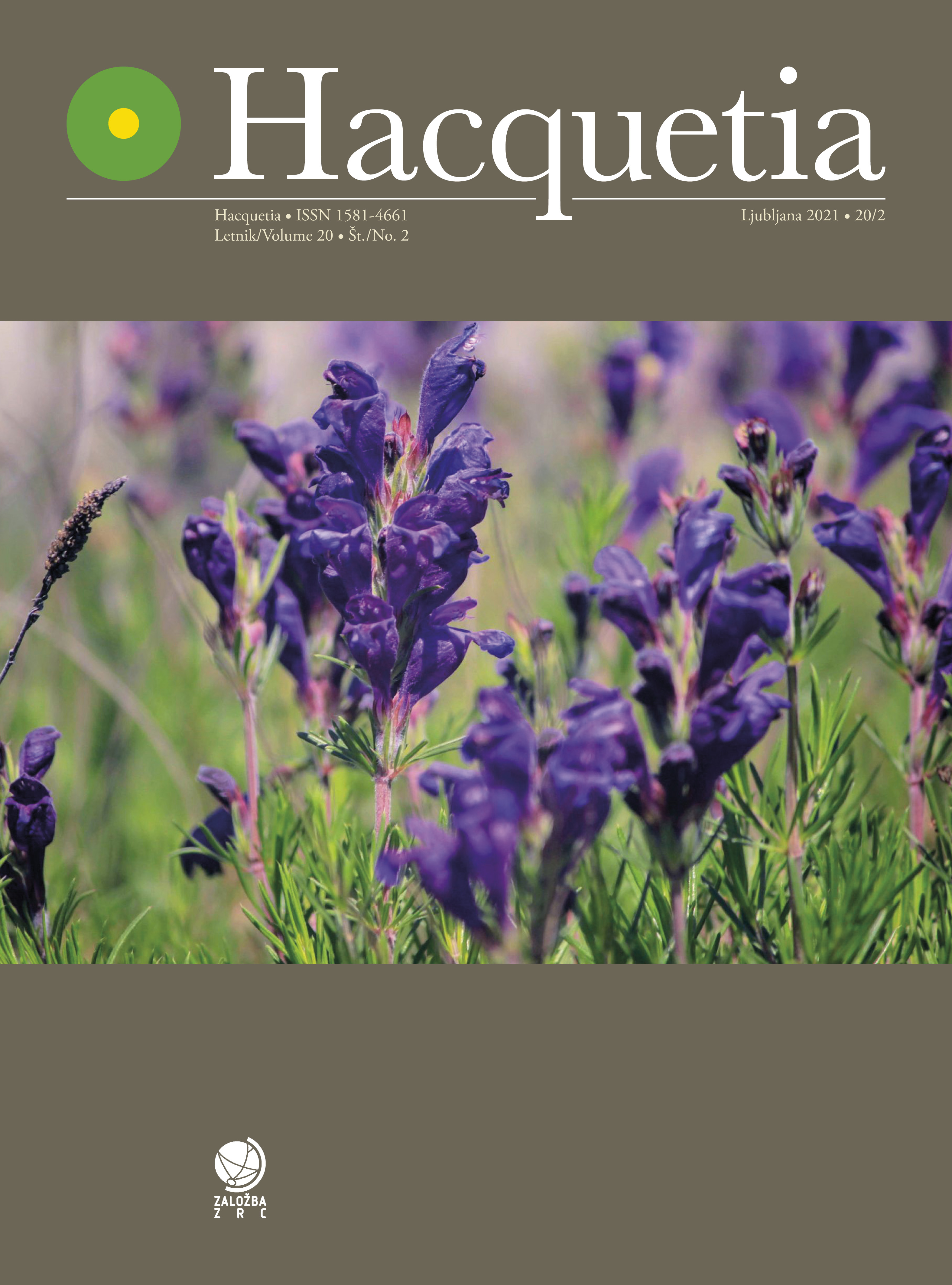Morphological variability of Trifolium repens L. (Fabaceae)
DOI:
https://doi.org/10.2478/hacq-2021-0009%20Ključne besede:
Trifolium repens, morphological variability, locations, taxonomic revisionPovzetek
The subject of our research was Trifolium repens L. The aim was to assess the level of morphological and anatomical variability among populations from different habitats (meadows, roadsides, subalpine slopes) and different altitudes (891- 1881 m) in Brezovica (Sharri Mountain- Kosovo). The investigation covered 26 morphological and anatomical traits in populations from 12 locations. From the results obtained during this research, it can be concluded that there is a significant difference among populations for most micro- and macro-morphological traits. There is also a tendency towards a reduction of most of the average values of the investigated parameters (total plant height, total leaf length, leaf petiole length, peduncle length, fruit weight, number of flowers in an inflorescence, stomata length on the upper leaf surface, and diameter of collateral bundle) in relation to altitude increase. However, trichome length showed consistency and was not affected by habitat and altitude changes. The results also lead to a proposal for taxonomic revision of this taxon.
Prenosi
Literatura
Abberton, MT., Fothergil, M., Collins, RP. & Marshall AH. 2006: Breeding forage legumes for sustainable and profitable farming systems. Aspects of Applied Biology 80: 81-87.
Archer, K.A & Robinson, G.G.1989: The role of stolons and seedlings in the persistence and production of white clover (Trifolium repens L.c.v. Huia ) in temperate pastures on the Northern Tablelands, New South Wales. Australian Journal of Agricultural Research 40: 605-616.
Atkin, O.K., Botman, B. & Lambers, H. 1996: The Causes of Inherently Slow Growth in Alpine Plants: An analysis Based on the underlying Carbon Economies of Alpine and Lowland Poa Species. Functional Ecology 10: 698-707. https://doi.org/10.2307/2390504
Carpenter, S.B. & Smith, N. D. 1975: Stomatal Distribution and size in southern Appalachian hardwoods. Canadian .Journal of Botany 53: 1153-1156. https://doi.org/10.1139/b75-137
Chapin, F.S. 1980: The mineral nutrition of wild plants. Annual Review of Ecology and Systematics 11: 233-260. doi:10.1146/annurev.es.11.110180.001313
Cordell, S., Goldstein, G., Meinzer, F. C. & Handley, L. L. 2002: Allocation of nitrogen and carbon in leaves of Metrosideros polymorpha regulates carboxylation capacity and δ 13 C along an altitudinal gradient. Functional Ecology 13: 811-818. https://doi.org/10.1046/j.1365-2435.1999.00381.x
Ellison, N.W., Liston, A., Steiner, J.J., Williams, W.M. & Taylor, N.L. 2006: Molecular phylogenetics of the clover genus (Trifolium – Legumiosae). Molecular Phylogenetics and Evolution 39: 688-705. DOI: 10.1016/j.ympev.2006.01.004
FAO 2015: Understanding Mountain Soils. Rome 169 pp. http://www.fao.org/3/a-i4704e.pdf
Forenbacher, S. 1990: Velebit i njegov biljni svijet. Školska knjiga, Zagreb, 453 pp.
Franel, I. & Steindor, K. 2013. Preliminary studies on the morphological variability among Arabidopsis halleri populations from contrasting habitats. Annales Botanici Fennici 50: 142-148.
Grime, J.P. 1977: Evidence for the existence of three primary strategies in plants and its relevance to ecological and evolutionary theory. American Naturalist 111: 1169 –1194.
Halil, K. & Rafet, A. 2009: The Effects of Altitude on Stomata Number and Some Vegetative Growth Parameters of Some Apple cultivars. Research Journal of Agriculture and Biological Sciences 5: 853-857.
Hoffman, A.A. & Sgro, C.M. 2011: Climate change and evolutionary adaptation. Nature 470: 479-485. https://doi.org/10.1038/nature09670.
Jahufer, M.Z.Z., Cooper, M., Ayres, J.F. & Bray, R.A. 2002. Identification of research to improve the efficiency of breeding strategies for white clover in Australia. Australian Journal of Agriculture Research 53: 239- 257. https://doi.org/10.1071/AR01110
Johnson, M., Smith, W.K.,Vogelmann, T.C. & Brodersen, C.G. 2005: Leaf Architecture and Direction of Incident Light Influence Mesophyll Fluorescence Profiles. American Journal of Botany 92: 1425–1431. doi: 10.3732/ajb.92.9.1425
Kao, W.Y. & Chang, K.W. 2001: Altitudinal trends in photosynthetic rate and leaf characteristics of Miscanthus populations from central Taiwan. Australian Journal of Botany. 49: 509-14. Doi: 10.1071/BT00028
Kofidis, G. & Bosabalidis, A.M. 2008: Effects of altitude and season on glandular hairs and leaf structural traits of Nepeta nuda L. Greece Botanical Studies 49: 363-372.
Körner, C. & Cochrane, P. 1983: Influence of plant physiognomy on leaf temperature on clear midsummer days in the Snowy Mountains, south-eastern Australia. Acta Oecologica 4:117-124.
Körner, C., Neumayer, M., Menendez-Riedl, S. P. & Smeets-Scheel, A.1989: Functional morphology of mountain plants. Flora 182: 353–383.
Kudo, G. 1995: Altitudinal effects on leaf traits and shoot growth of Betula platyphylla var. japonica. Canadian Journal of Forest Research 25: 1881-1885. DOI: 10.1139/x95-203
Lewis, G.P. 2005: Caesalpinieae. In: Lewis, G., Schrire, B., Mackinder, B., Lock, M. (eds.): Legumes of the world, Richmond, U.K, Royal Botanic Gardens, Kew, pp. 127–161.
Lluga, K., Šoljan, D. & Sherifi, E. 2014: Samples of Ecological – Morphological differentiation of Trifolium pratense L. in Vertical Profile of Brezovica (Sharri Mountain, Kosovo). Ecology and Safety 8: 135-145.
Michael, D., Morecroft, F. & Woodward, F.1996: Experiments on the Causes of Altitudinal Differences in the Leaf Nutrient Contents, Size and δ13C of Alchemilla alpina. New Phytology 134: 471-479. https://doi.org/10.1111/j.1469-8137.1996.tb04364.x
Nicholas, H. & Andrew, D.R. 2009: Stomatal length Correlates with Elevation of Growth in Four Temperate Species. Journal of Sustainable Forestry 28: 63-73. https://doi.org/10.1080/10549810802626142
Pllana, R. 2015: Climate of Kosovo. Kosovo Academy of Sciences and Arts, Prishtina, 320 pp.
Pompelli. M.F., Martins , S.C.V., Celin, E.F., Ventrella , M.C. & DaMatta, F.M. 2010: What is the influence of ordinary epidermal cells and stomata on the leaf plasticity of coffee plants grown under full-sun and shady conditions? Brazilian Journal of Biology 70: 1083-1088.
DOI: 10.1590/s1519-69842010000500025
Sabeti, H. 1965: Trees and shrubs native to Iran. Tehran University Press. 430 pp.
Snaydon, R.W. 1962: Micro-distribution of Trifolium repens L. and its relation to soil factors. Journal of Ecology 50:133-143. https://doi.org/10.2307/2257198
Scatena, V.L., Giulietti, A.M., Borba, E.L. & van der Berg, C., 2005: Anatomy of Brasilian Eriocaulaceae: correlation with taxonomy and habitat using multivariate analyses. Plant Systematic Evolution 253: 1-22. DOI: 10.1007/s00606-004-0295-z
Selvi, F. & Bigazzi, M.2001: Leaf surface and anatomy in Boraginaceae tribe Boragineaea with respect to ecology and taxonomy. Flora 196:269-285. DOI: 10.1016/s0367-2530(17)30056-7
Sultan, S.E. 2000: Phenotypic plasticity for plant development, function and leaf history. Trends in Plant Science 5: 537- 542. DOI: 10.1016/s1360-1385(00)01797-0
Turkington, R. & Burdon, J.J. 1983: Biology of Canadian weeds, 57. Trifolium repens L. Canadian Journal of Plant Science 63: 243-266.
Williams, WM. 1987: White clover taxonomy and biosystematics. In: Baker, M. J. & Williams W. M. (eds. ): White clover , Waillingford, CAB International, pp. 323-342.
Woodward, F.I & Kelly, C.K. 1995. The influence of Co2 concentration on stomatal density. New Phytologist 131: 311- 327. https://doi.org/10.1111/j.1469-8137.1995.tb03067.x
Yaqoob, U. & Ahmad, N.I. 2015: Impact of habitat variability and altitude on growth dynamics and reproductive allocation in Ferula jaeschkeana Vatke. Journal of King Saud University- Science 29: 19-27. https://doi.org/10.1016/j.jksus.2015.10.002
Zhenzhu, X. & Guangsheng, Zh. 2008: Responses of leaf stomatal density to water status and its relationship with photosynthesis in a grass. Journal of Experimental Botany 59: 3317–3325.
doi: 10.1093/jxb/ern185
Objavljeno
Kako citirati
Številka
Rubrike
Licenca
Avtorske pravice (c) 2021 ZRC-SAZU

To delo je licencirano pod Creative Commons Priznanje avtorstva-Nekomercialno-Brez predelav 4.0 mednarodno licenco.
Avtorji jamčijo, da je delo njihova avtorska stvaritev, da v njem niso kršene avtorske pravice tretjih oseb ali kake druge pravice. V primeru zahtevkov tretjih oseb se avtorji zavezujejo, da bodo varovali interese založnika ter da bodo povrnili morebitno škodo.
Podrobneje v rubriki: Prispevki













